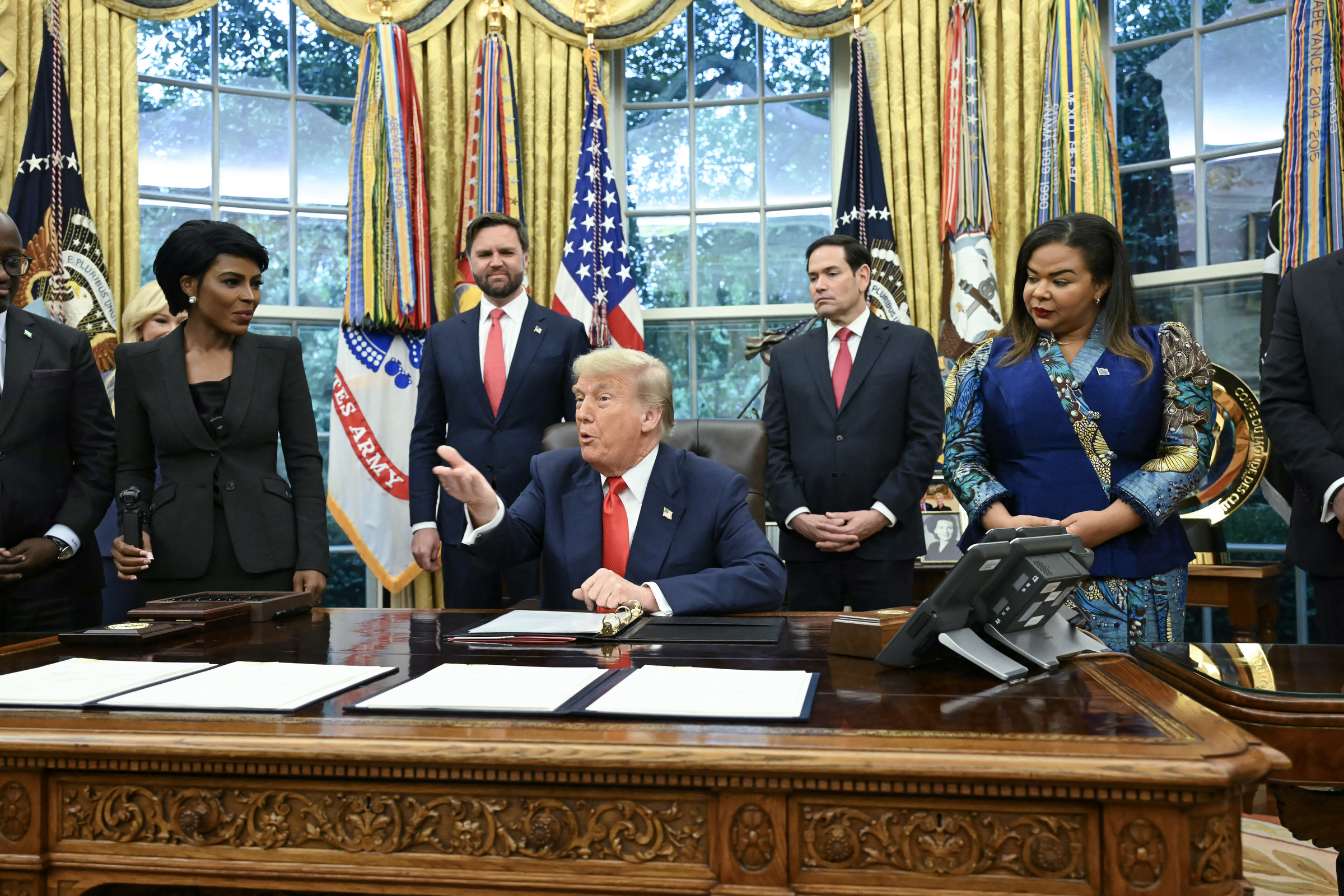At a June 27 ceremony in the Oval Office, President Donald Trump celebrated a US-brokered peace agreement between Rwanda and the Democratic Republic of Congo (DRC). This is the latest mediation effort in the American leader's ambition to resolve global conflicts.
"We just ended a 30-year war that resulted in 6 million deaths. No other president could have done that," Trump said as the DRC and Rwandan foreign ministers signed the agreement.
The peace agreement between the two African nations could bring Trump closer to the Nobel Peace Prize he has long coveted. He posted on social media last week that he wouldn't receive the Nobel Peace Prize "no matter what I do," but asserted that "the people know, and that's all that matters to me."
 |
US President Donald Trump at a ceremony in the Oval Office on 27/6. Photo: AFP |
US President Donald Trump at a ceremony in the Oval Office on 27/6. Photo: AFP
He praised the efforts of African envoy Massad Boulos, a Lebanese-American businessman and Trump's in-law, in facilitating the agreement between Rwanda and the DRC.
The animosity between the DRC and Rwanda stems from colonial-era border disputes and escalated after the 1994 Rwandan genocide, according to Congolese activist and researcher Daniel Kubelwa.
During the genocide, hundreds of thousands of Tutsis and moderate Hutus were killed by Hutu militias. Rwanda criticized the DRC for incorporating Hutu militias into its army to fight the predominantly Tutsi M23 armed group.
M23, which first emerged in 2012, is considered one of the most prominent armed groups vying for control of Congo's mineral resources. The group also claims to protect the interests of Tutsis and other minority groups of Rwandan origin in the DRC.
UN experts and the international community believe Rwanda has supported M23, bringing the country to the brink of war with the DRC over alleged territorial violations.
The Rwandan government denies supporting M23, but asserts it will defend itself against Hutu militias operating in the DRC, viewing the group as "an existential security threat."
Over 7,000 people have died and around one million have been displaced since January, when M23 launched a new offensive against the DRC army, seizing control of two major cities in the east.
A December report by the UN Group of Experts on the DRC found evidence that the African nation's minerals were "smuggled into Rwanda, then mixed with Rwandan minerals."
Rwandan President Paul Kagame sparked outrage last year when he publicly acknowledged that Rwanda was a transit point for minerals smuggled from the DRC, but insisted his country was not stealing its neighbor's resources.
In the peace agreement signed on 27/6, Rwanda and the DRC agreed to cease hostilities and stop supporting armed groups that pose security threats to each other's territories. They also pledged to enhance economic cooperation, including in the mining and processing of minerals and other resources.
Many details of the agreement remain unclear, such as how violations will be addressed. However, Trump and his aides emphasized the agreement as a "pivotal moment" after 30 years of tension between Rwanda and the DRC.
Observers have also acknowledged this.
"Despite the challenges, this is a significant agreement and a promising path forward," said Jason K. Stearns, founder of the Congo Research Group at New York University.
President Trump has sought to end several other conflicts around the world, from the war in Ukraine and Gaza Strip to the recent clashes between Israel and Iran.
The situation in Iran exemplifies Trump's "peace through strength" strategy. On the morning of 22/6, the US president ordered bomber strikes on three Iranian nuclear facilities, declaring he would "obliterate" these targets, then invited Tehran to the negotiating table.
Trump announced a day later that Iran and Israel had agreed to a comprehensive ceasefire starting 24/6, ending 12 days of bloody conflict between the two Middle Eastern countries.
"He has the confidence that he can overcome any obstacle through strength," said Richard Haass, former director of the Council on Foreign Relations and a veteran diplomat.
The White House chief warned the Rwandan and Congolese foreign ministers on 27/6 that "we will make sure you implement the agreement." "You'd better implement it, or we will impose severe sanctions," he said.
 |
US President Donald Trump in the Netherlands on 24/6. Photo: AP |
US President Donald Trump in the Netherlands on 24/6. Photo: AP
In May, Trump also announced on Truth Social that India and Pakistan had agreed to a ceasefire "after a long night of US-mediated negotiations." At the time, the two countries had experienced their most serious fighting since 1999, with a series of cross-border attacks, raising concerns about a full-blown war between the two nuclear-armed nations.
The Indian and Pakistani governments later confirmed the ceasefire, but India denied US mediation, saying it was the result of bilateral negotiations.
The precise role of the US in this ceasefire and whether the Pakistan-India agreement can be sustained remain open questions. But these agreements once again recall former US Secretary of State Madeleine Albright's famous remark that "America is the indispensable nation" in many world affairs.
At the same time, they also help Trump cultivate an image as a powerful leader capable of ending conflicts and mediating globally, according to observers.
US Secretary of State Marco Rubio praised the White House chief's efforts in resolving global conflicts at the Oval Office event on 27/6. "President Trump is the president of peace. He truly wants peace and prioritizes it above all else," Rubio said.
Thuy Lam (Washington Post, CNN, FT)












